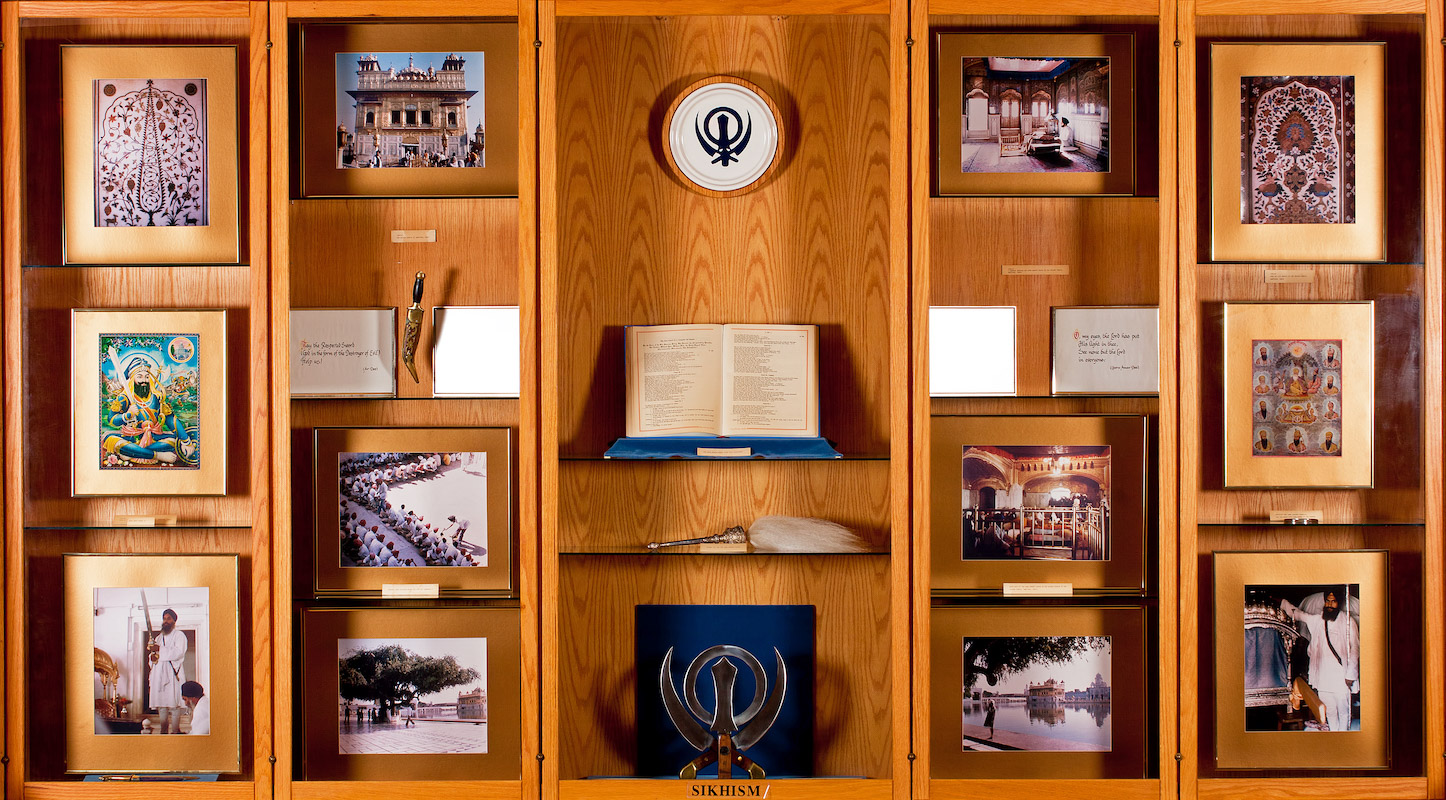Sikhism
Mul Mantra: Basic Principles as taught by Guru Nanak
“There is One Reality, the Unmanifest – Manifested;
Ever-Existent, He is Nam (Conscious Spirit), The Creator: Pervading all;
Without fear; without enmity;
The Timeless; the Unborn and the Self-existent;
Complete within Itself.”“Through the favor of His true Servant, the Guru, He may be realized.
He was when there was nothing;
He was before all ages began;
He existeth now, O Nanak, and shall exist forever.”—Guru Granth Sahib
“Truthfulness, contentment, and divine knowledge are obtained by hearing the name of God.” —Guru Granth Sahib

Ek Ong Kar Sat Nam
Sikhism emphasizes the importance of selfless service, devotion, purification, and intense repetition of God’s name: Sat Nam, Waheguru. A Sikh believes that there is only one God and that all people are equal in His eyes. The Sikh path toward oneness with God is the active way of the warrior.
Sikhism has ten great Gurus. Each embodied a specific spiritual quality and made important contributions to the Sikh movement. The Sikh religion was born in the 15th Century when Guru Nanak, the first of these ten Gurus, began to teach people how to find happiness and peace through repeating the name of God.
Among the other Gurus were Guru Angad, the second Guru, who created the language of Gurmukhi for the transmission of spiritual understanding; Guru Amar Das, the third Guru, who was a vigorous proponent of equality among all people regardless of social or economic position; Guru Ram Das, the fourth Guru, who dug the water tank for what was later to become the Holy City of Amritsar; and Guru Arjun, the fifth Guru, who completed the building of the most holy temple of Sikhism, the Golden Temple in the city of Amritsar.
Guru Arjun also initiated the holy book, the Guru Granth Sahib, by compiling orally-preserved sayings, songs, and teachings of the four previous masters.
The last of the ten Gurus, Guru Gobind Singh, established the Khalsa Order, or “Brotherhood of the Pure Ones,” using a baptism ceremony and the five symbols (white clothes for purity, a sword for bravery, an iron bracelet for morality, uncut hair for renunciation, and a comb for cleanliness). He finished the compilation of the Guru Granth Sahib, and at the end of his life, declared that it was to be considered the Guru from that point forward. This book of song and prayer is sung daily by devout Sikhs.
Central to many of the Sikh cultural and religious practices is human equality. Sikhs are opposed to formalism and ritualism. Each Sikh is encouraged to find God in his or her own way, using wisdom and common sense. However, the teachings of the Guru are of utmost importance as a guide. “Various are the manifestations of God and various His ways. Various are the guises He assumes, but He is ever One.” —Guru Arjun
All faiths Hall Quotations
All Faiths Hall Quotations
“May the Respected Sword (God in the form of the Destroyer of Evil) help us!”
—Ar Das
“Knowing God as the source of peace and harmony,
And washing off ego and sin through the Guru’s Word,
One comes to live in the True State of fearlessness.”
—Guru Nanak
“O my foolish mind, why do you cry on? You get what is ordained. For God is the dispenser of pleasure and pain. So leave all else and call only on Him.”
—Guru Arjun
“O my eyes, the Lord has put His light in thee, See none but the Lord in everyone.”
—Guru Amar Das
“They distinguish and separate one Guru from the other. And rare is the one who knows that they, indeed, were one. They who realised this in their hearts, attained Realisation of God.”
—Guru Gobind Singh, Dohira, Vachitra Natak

